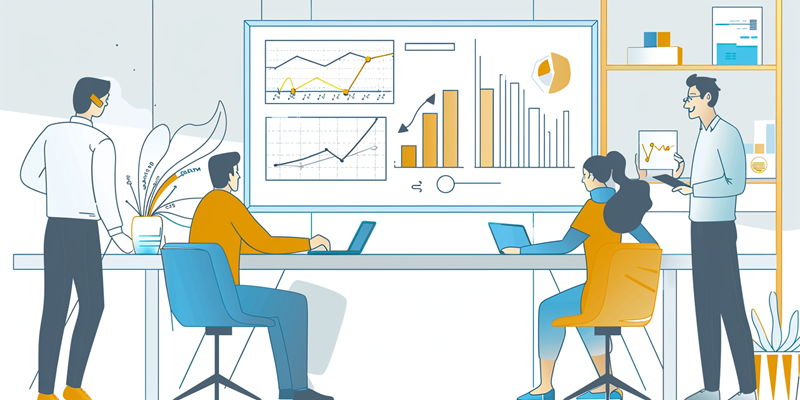In today’s market, well-informed customers enter transactions with hefty expectations, demanding that sales teams step up. Sales enablement is pivotal in empowering salespeople, providing them with the requisite tools, insights, and support to not only meet but surpass these heightened buyer demands. This strategic approach is essential for adapting to the evolved consumer intelligence, making sure that sales professionals can deliver an exceptional customer experience. By leveraging technological advancements, sales enablement optimizes efficiency and efficacy in sales processes. It has become indispensable for keeping pace with the savvy buyer, ensuring that the sales force can engage effectively and deliver value in every interaction. Ultimately, sales enablement is about bridging the gap between buyer expertise and seller capability, guaranteeing that sales teams excel in an intricate selling environment.
Understanding the Value of Sales Enablement
Sales enablement serves as a critical bridge connecting sales teams with the information, tools, and content necessary to engage knowledge-savvy buyers. In today’s hyper-competitive market, it’s not enough for sales professionals to understand their products; they must also be experts in their industry, adept at interpreting customer data, and nimble with technology. With sales enablement, representatives gain access to time-sensitive information and can articulate the value proposition of their offerings with supreme confidence. This alignment of resources and knowledge fuels productivity and sharpens efficiency, enabling sales teams to execute their strategies with precision.
A robust sales enablement strategy involves meticulously crafted content that resonates with target audiences, streamlined access to information, and agility in handling objections and queries. As sales teams harness these tools and insights, they find themselves better equipped to foster meaningful conversations, build stronger relationships, and, ultimately, close more deals – all contributing to an elevated level of sales performance and customer satisfaction.
Aligning Sales Strategies with Customer Expectations
Creating a consistent and memorable customer experience is a cornerstone of sales enablement. In a market driven by informed buyers, there is a premium on syncing sales strategies with what customers expect and value. This alignment is a critical factor in cultivating customer trust and loyalty. When sales messages resonate with clients’ needs and priorities, the likelihood of forging long-lasting relationships increases manifold. Sales enablement ensures that the sales force is not just delivering information but also creating connections that reflect understanding and reliability.
For businesses, establishing a systematic approach to conveying unified messaging provides a strategic advantage. It equates to a consistent brand experience that bolsters customer confidence and encourages brand advocacy. In the grand tapestry of customer relations, each thread must be woven with care; sales enablement provides the loom that ensures each interaction fits into the larger, harmonious pattern of the customer journey.
Adopting AI in Sales Enablement Platforms
Artificial intelligence is revolutionizing sales enablement platforms, promising a leap in productivity and relationship management. AI-powered tools can automate routine tasks such as content management and lead scoring, enabling sales reps to dedicate more time to customer-facing activities that demand a personal touch. By utilizing AI, teams can identify the most promising prospects, personalize outreach, and deliver timely, relevant content that addresses the unique challenges and pain points of each lead.
Moreover, AI’s analytical capabilities mean that sales teams are continuously learning from customer interactions, improving the accuracy of their strategies over time. These technologies not only refine the sales process but also help create a deeper understanding of customer behavior, leading to more engaging and fruitful conversations.
Driving Sales with Advanced Training and Technology
The landscape of sales is ever-evolving, necessitating continual training to keep teams at the forefront of industry trends and technological advancements. Soft skills such as active listening and empathetic communication, paired with an intimate knowledge of the market and product intricacies, are indispensable in the age of the informed buyer. Sales enablement empowers teams by providing them with comprehensive training modules and access to cutting-edge technology tools.
Customer relationship management systems, sales engagement platforms, and collaboration tools are pivotal in this educational ecosystem. These technologies not only streamline the sales process but also provide analytics that guide training priorities and strategies. By leveraging such tools, sales professionals refine their techniques and tailor their approach to each unique customer scenario, thereby enhancing the overall buying experience.
Productivity Tools that Empower Sales Teams
Empowering sales teams with productivity tools is a strategic imperative in sales enablement. The integration of CRMs, automated analytics, mobile sales applications, and communication platforms can dramatically increase efficiency, allowing sales teams to focus on what truly matters—the customer. These tools mitigate the burden of administrative tasks, optimize engagement efforts, and impart valuable insights that can guide decision-making and strategy refinement.
Investing in the right technology correlates to improved sales outcomes, as teams can swiftly identify opportunities, track customer interactions, and prioritize leads more effectively. In a sales environment where every second counts, having the right productivity tools can be the difference between winning and losing a potential deal.
Adapting to Market Demands with Sales Enablement
As buyer behavior continues to evolve, sales enablement emerges as a crucial strategy for adapting to market demands. The contemporary sales team must be dynamic, informed, and agile, utilizing a range of resources to deliver a customer experience that stands out. Sales enablement is the bedrock upon which these capabilities are built, promoting a culture of continuous learning and technological adaptation.
A well-implemented sales enablement strategy can be the catalyst for sustained revenue growth and competitive differentiation. Addressing the informed buyer’s expectations isn’t just about having the right answers; it’s about creating a dialogue that’s informed by insights, augmented by technology, and characterized by genuine customer engagement—a formula for sales success in today’s buyer-informed market.

